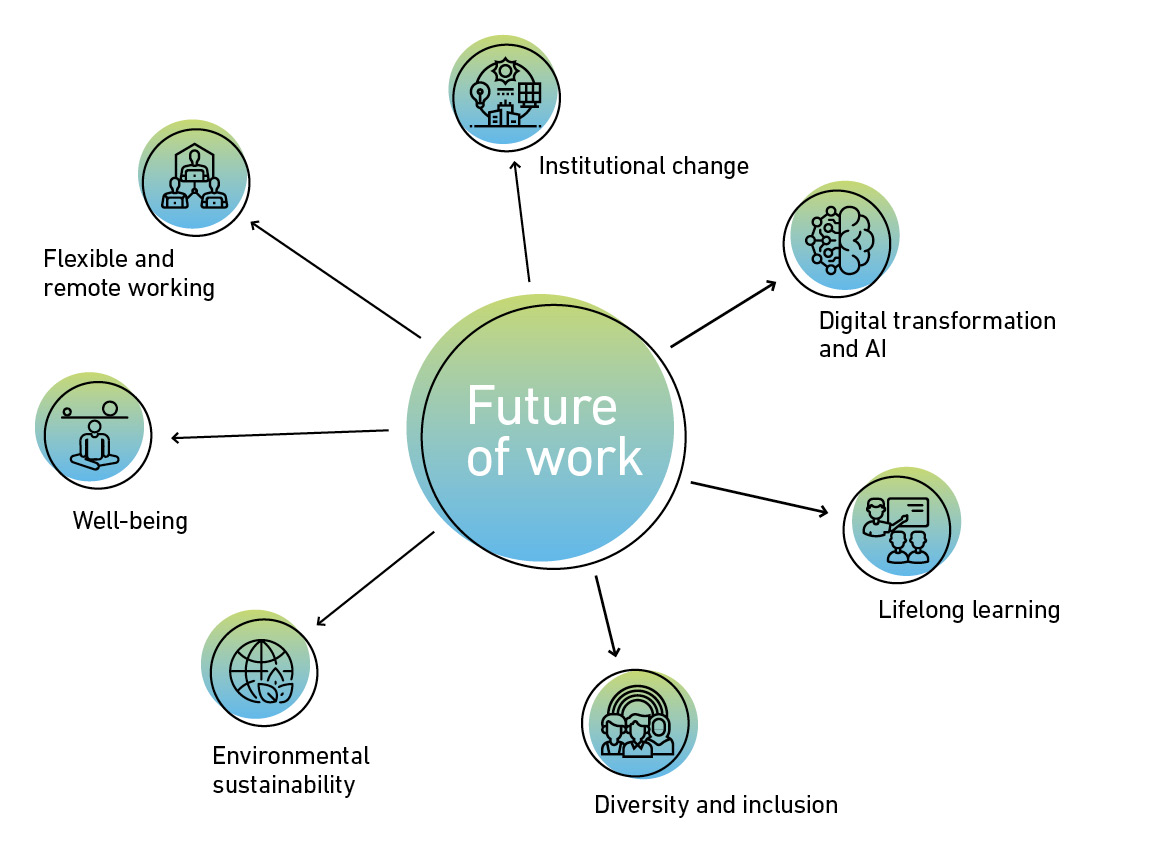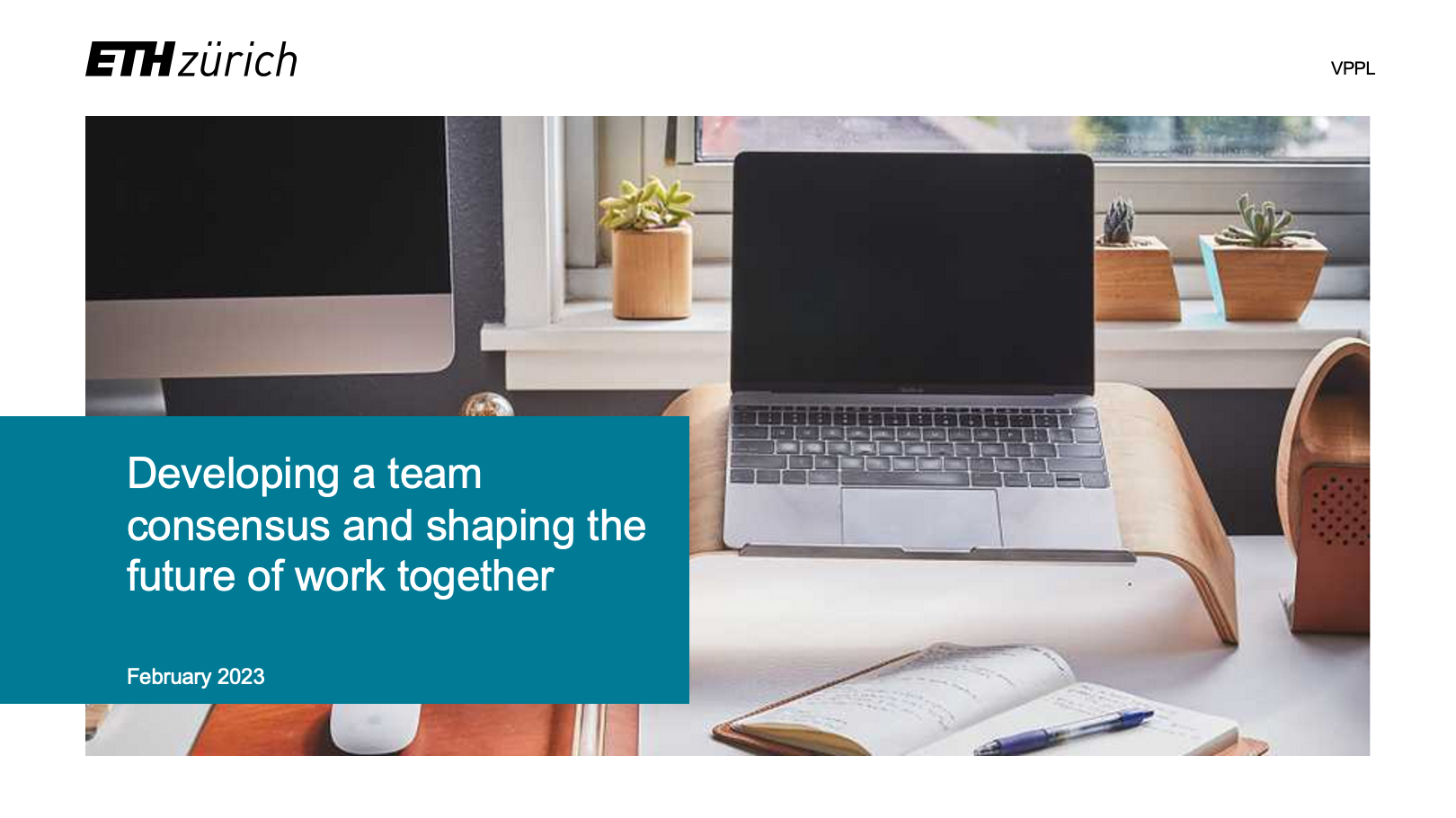Future of work
At ETH Zurich, we shape the future of work together. With the position paper, which also contains goals and recommendations for employees and supervisors, we confirm our intention to meet the requirements of the institution, ensure the well-being of employees and protect the environment in the future of work.
Each employee plays an important role in shaping the future of work. The position paper on the future of work addresses a selection of emerging themes that are important for the current and the future of work at ETH. These include institutional change, digital transformation and artificial intelligence, lifelong learning, diversity and inclusion, environmental sustainability, well-being and flexible and remote working.

Recommendations for employees and managers
Every employee plays an important role in shaping the future of work. Our actions, attitudes and willingness to try out new things are crucial. The following recommendations show how you can play a constructive role in shaping the future of your work and contribute to the culture that fosters it. The recommendations are based on the ETH social and leadership competences.
For employees in a leadership position:
- Navigate organisational change effectively by communicating the vision and purpose of changes early on and engaging employees in the change process.
- Lead by example to give others clear guidance on how to manage flexible and remote working, how to draw clear boundaries between work and private life and how to be inclusive in an increasingly diverse working environment.
- Seek consensus actively within the team regarding how you want to work and collaborate in the modern (hybrid) working environment. Communicate the results to newcomers and review as needed. In the current case, with regard to flexible working; in the future, with regard to other significant changes.
- Embrace sustainable practices like desk-sharing and minimising business-related air travel. Consider re-evaluating space utilisation by integrating the value of sharing into your work routine.
- When denying a request (e.g. regarding flexible working), communicate the reasons actively, transparently and respectfully.
For all employees:
- Challenge one’s own beliefs and perspectives about traditional ways of working and seek to change habits where helpful.
- Adopt a mindset of sharing and seeking opportunities to collaborate or share knowledge and resources.
- Engage in sustainable work practices, such as conserving and sharing resources.
For employees in a leadership position:
- Be bold enough to transform ways of working.
- Grant employees a period within which they can learn from and adjust to new ways of working.
- Create cross-functional and/or interdisciplinary teams to stimulate innovation and work on new, meaningful and sustainable solutions to problems.
For all employees:
- Adopt a flexible and adaptable mindset, recognise new trends and opportunities in ways of working together and try them out.
- View work as a set of activities instead of a place within which to perform them.
- Experiment with different solutions to the challenges associated with desk-sharing and other future work arrangements.
- Be open to and explore new technologies that support future ways of working.
- Co-create institutional change by engaging actively in change processes.
For employees in a leadership position:
- Engender trust in your remote team members' working processes, in their ability to manage their responsibilities effectively and work autonomously.
- Ensure regular communication inside and outside the remote working environment by making use of formal and informal online communication channels. Regular check-ins and one-on-one meetings can provide an outlet for openly communicate any concerns that an individual may have.
- Be available and accessible when remote employees need assistance or have questions, providing them with ample avenues for communication, such as instant messaging or virtual video conferencing platforms.
For all employees:
- Communicate proactively and give direct feedback when information is missing in the context of change processes or where there is a general lack of communication.
- Contribute to a community spirit by actively participating in remote gatherings, including turning on your camera during video calls and engaging fully in discussions.
- Actively embrace the unique opportunities provided by the physical workplace to foster spontaneous encounters and discussions. Ensure you are approachable and available to colleagues who might not typically reach out to you.
For employees in a leadership position:
- Promote a work-life balance by providing flexible work arrangements, such as remote work options that enable employees to manage their workload and personal lives effectively.
- Encourage employees to set clear boundaries between their work and private life by, for example: turning off e-mail apps in their free time; informing others of their working times and availabilities; communicating their own boundaries to colleagues and giving feedback when these boundaries have been crossed; keeping track of working hours; and creating clear time slots for work and private life.
- Be mindful of possible negative signs, such as exhaustion or isolation in your team.
For all employees:
- Practice self-care by, for example, making time for exercise, meditation and relaxation to build up resilience against daily stressors.
- Communicate your own needs with regards to work schedules and your work-life balance, such as requesting flexible work hours, working from home to reduce daily stressors and communicating your availability.
- Respect your colleagues' time off and personal boundaries. Avoid calling or messaging them during their known non-working hours or when they are on leave.
- Discuss expected response times to e-mails and other forms of communication.
For employees in a leadership position:
- Take advantage of opportunities to build a diverse workforce by hiring qualified individuals from various backgrounds, genders and cultures.
- Inform employees on the growing importance of inclusivity and diversity and communicate your expectations of promoting a respectful and inclusive environment.
- Distribute attention and communicate in an active and equal manner with all employees in a remote working environment.
- Factor people's different needs (e.g. in terms of career and life phases) and personality types (e.g. introvert/extrovert) into your decisions, which can influence how and where they work the most effectively.
For all employees:
- Recognise the pivotal role inclusivity plays in facing the challenges that lie ahead, both within and outside the academic context.
- Encourage open and respectful communication in the workplace by being an active listener and valuing others’ opinions.
- Beware of and actively prevent an 'us versus them' mentality that can arise from differing work preferences, such as working from home or on-site. This involves being aware of and addressing the underlying beliefs that contribute to such divisions.
- Take action to promote inclusivity by speaking up about instances of exclusion or discrimination.
For employees in a leadership position:
- Promote employee autonomy by providing employees with a sense of ownership and control over their work.
- Value results over mere presence in the physical workplace.
- Provide feedback instead of micromanaging. Empowered employees are free to explore within the framework of the objectives and necessary resources provided.
- Coach employees to enable them to develop the skills needed to solve problems independently in an increasingly complex work environment.
- Anticipate and provide the necessary training and resources to support employee upskilling and growth, for example, with regard to digital competencies.
For all employees:
- Take advantage of opportunities to upskill in response to changing needs.
- Identify and pursue opportunities for your own career growth and skills development, in anticipation of evolving external demands and personal career goals.
- Encourage professional growth among your colleagues by sharing knowledge and expertise.
Workshop: developing open dialogue and team consensus
Flexible ways of working harbour great opportunities. At the same time, they require openness and ingenuity in order to find good solutions for individuals and the team. It is important to get to know the various expectations and possibilities and to find a way of working that best satisfies both the team's wishes and tasks.
Utilise the workshop to find a consensus within the team and adapt your working methods accordingly. The workshop enables you to work together with your team on three important aspects of the future of work: Working together, achieving goals, team cohesion and well-being.
Workshop template for supervisors and their teams
Download (PPT)
protected page lock Team consensus workshop (PPTX, 5.8 MB)Contact
Vizepräsidium für Personalentwicklung und Leadership
Binzmühlestrasse 130
8092
Zürich
Schweiz
